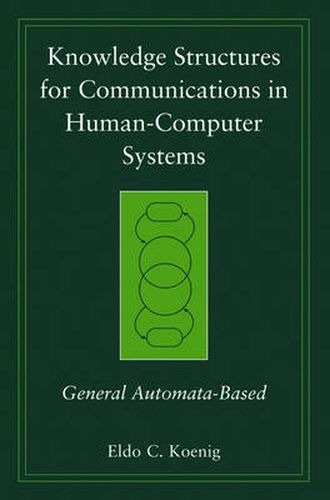Readings Newsletter
Become a Readings Member to make your shopping experience even easier.
Sign in or sign up for free!
You’re not far away from qualifying for FREE standard shipping within Australia
You’ve qualified for FREE standard shipping within Australia
The cart is loading…






A comprehensive look at General automata and how it can be used to establish the fundamentals for communication in human-computer systems Drawing on author Eldo C. Koenig’s extensive expertise and culling from his thirty-four previously published works, this seminal resource presents knowledge structures for communication in Human-Computer Systems (HCS) based on General automata. The resulting model provides knowledge representations for software engineering. Of the many features required for a method to achieve the desired communication in HCS, Knowledge Structures for Communications in Human-Computer Systems identifies six of them in great length-extracting and storing the knowledge of sentences; knowledge association; deductive processes; inferences; feedback; and sequencing of knowledge-along with illustrations for achieving them by the General Automata Method. After presenting the analysis for each feature, the book includes practical applications that illustrate the results. Koenig also describes algorithms and programs that achieve some of the features, and provides readers with additional algorithms and further research. Richly illustrated throughout to elucidate concepts, Knowledge Structures for Communications in Human-Computer Systems is an excellent teaching text suitable for both academic and industrial settings.
$9.00 standard shipping within Australia
FREE standard shipping within Australia for orders over $100.00
Express & International shipping calculated at checkout
A comprehensive look at General automata and how it can be used to establish the fundamentals for communication in human-computer systems Drawing on author Eldo C. Koenig’s extensive expertise and culling from his thirty-four previously published works, this seminal resource presents knowledge structures for communication in Human-Computer Systems (HCS) based on General automata. The resulting model provides knowledge representations for software engineering. Of the many features required for a method to achieve the desired communication in HCS, Knowledge Structures for Communications in Human-Computer Systems identifies six of them in great length-extracting and storing the knowledge of sentences; knowledge association; deductive processes; inferences; feedback; and sequencing of knowledge-along with illustrations for achieving them by the General Automata Method. After presenting the analysis for each feature, the book includes practical applications that illustrate the results. Koenig also describes algorithms and programs that achieve some of the features, and provides readers with additional algorithms and further research. Richly illustrated throughout to elucidate concepts, Knowledge Structures for Communications in Human-Computer Systems is an excellent teaching text suitable for both academic and industrial settings.